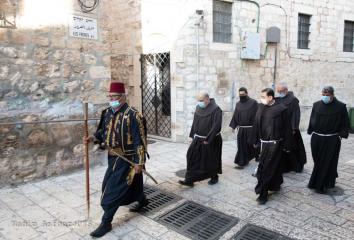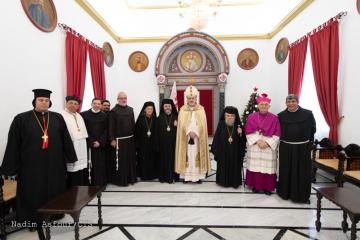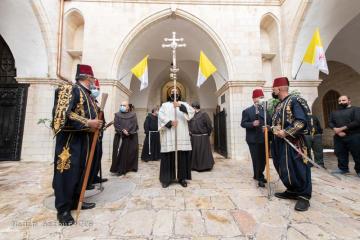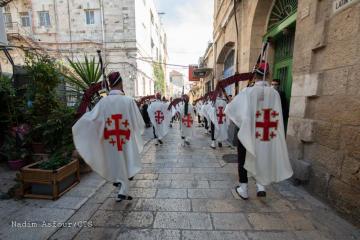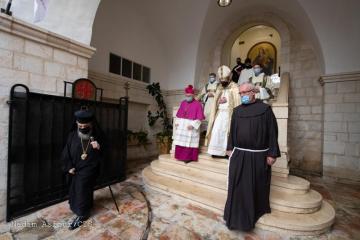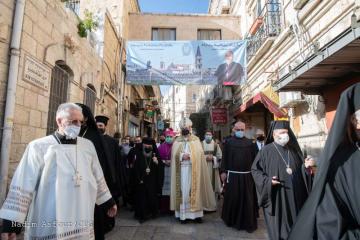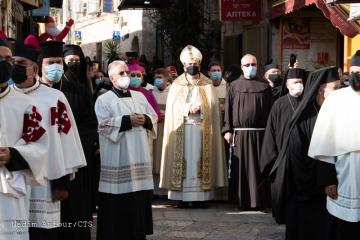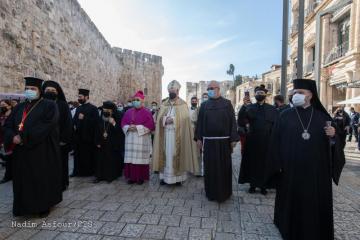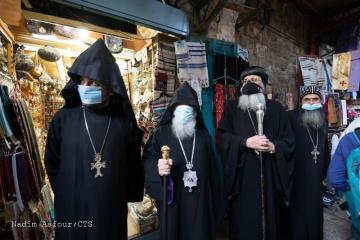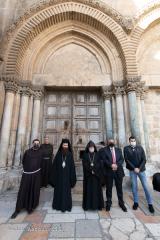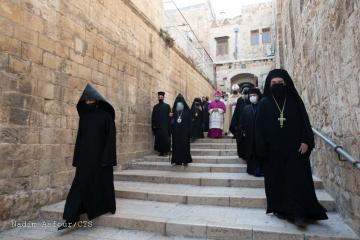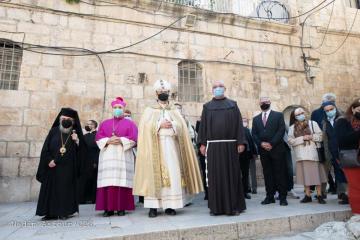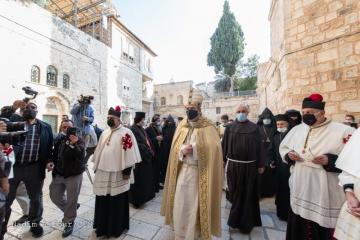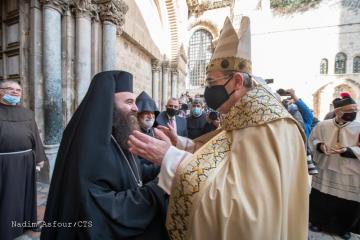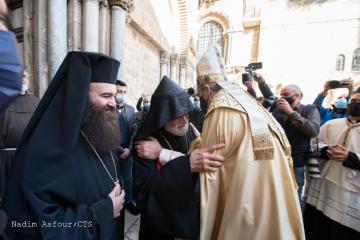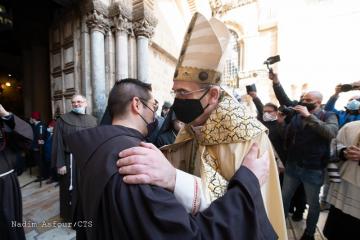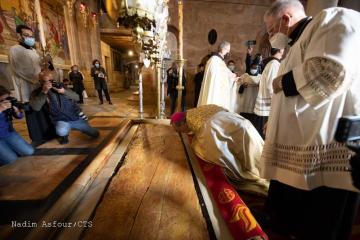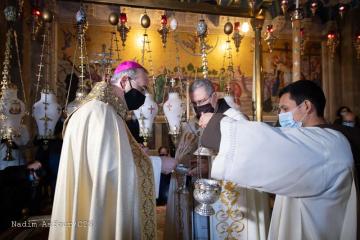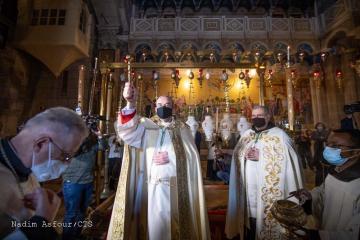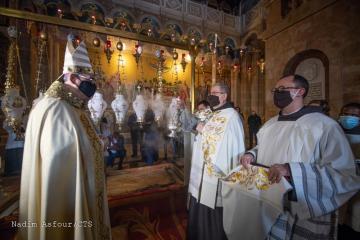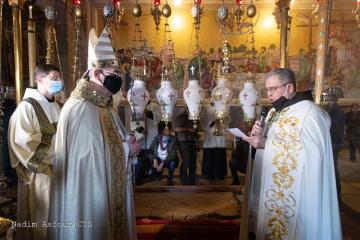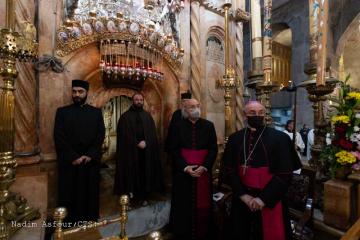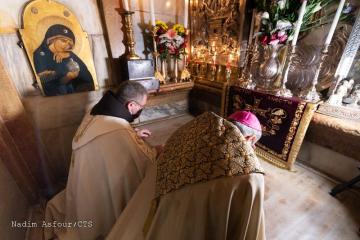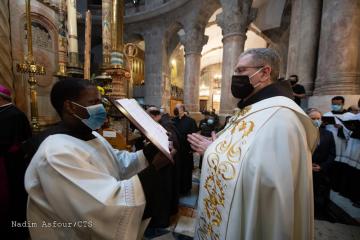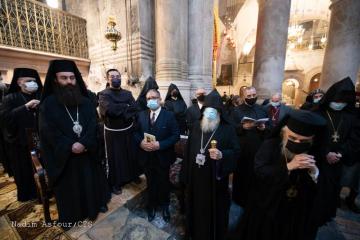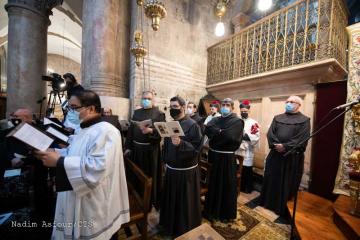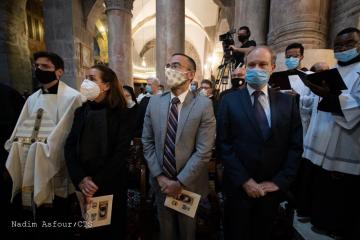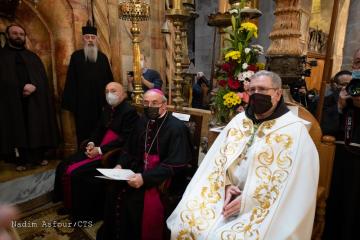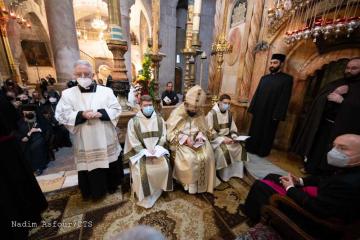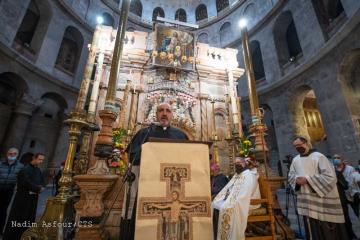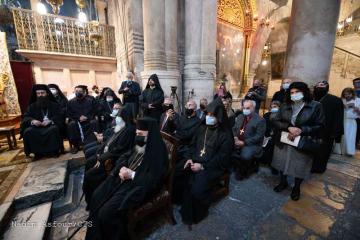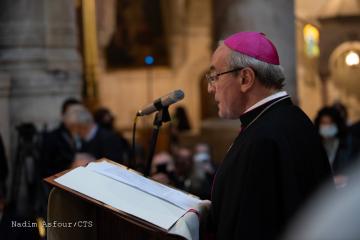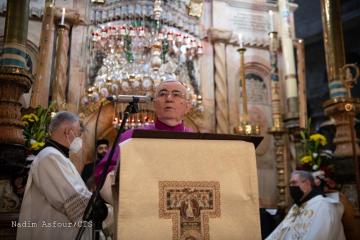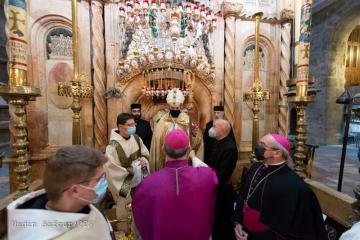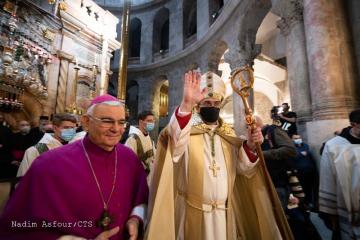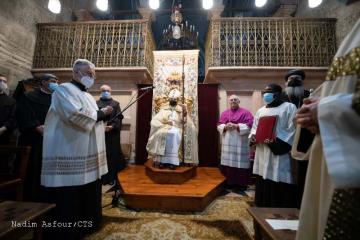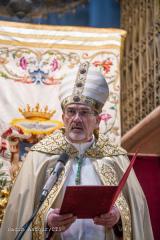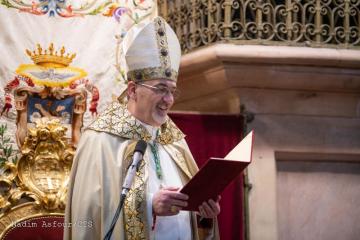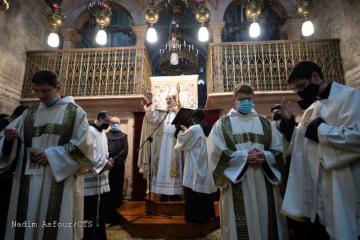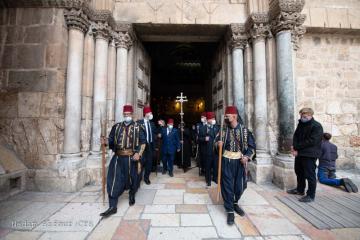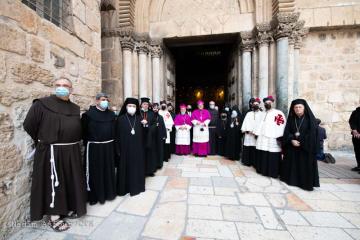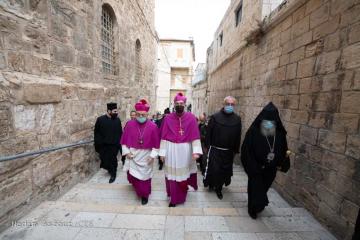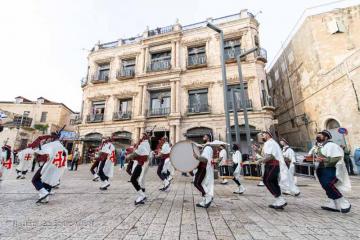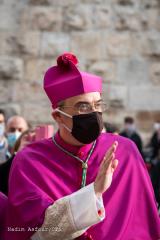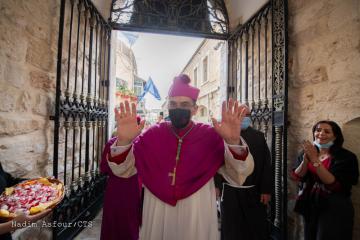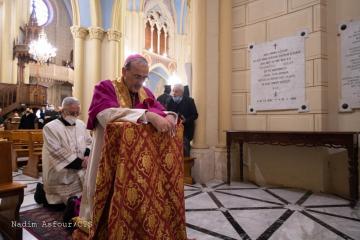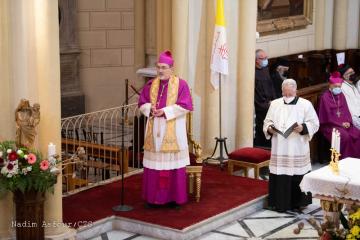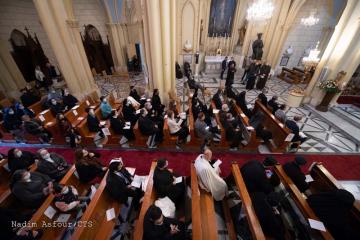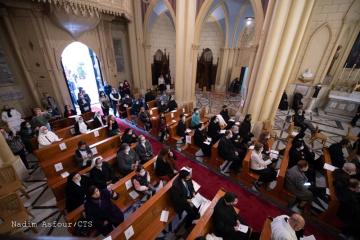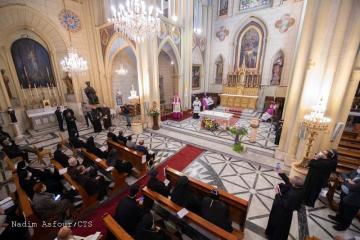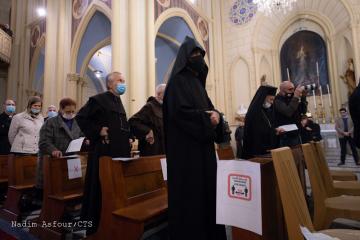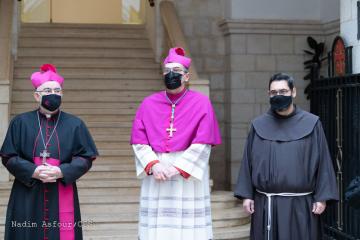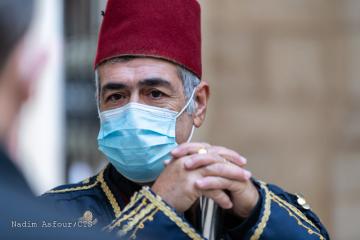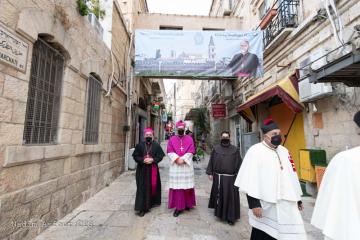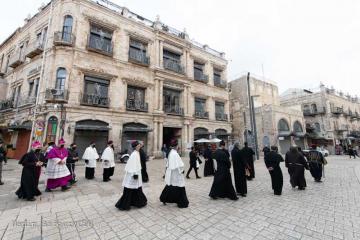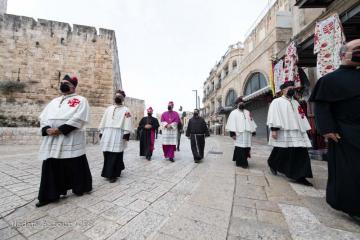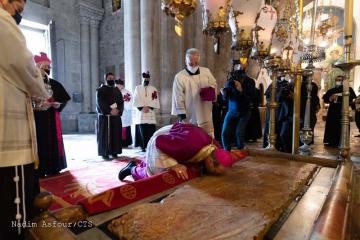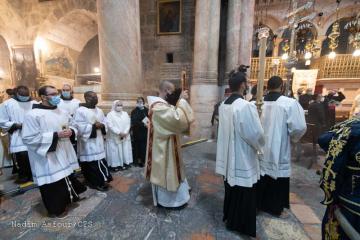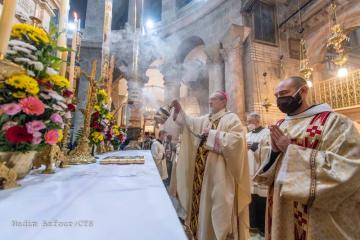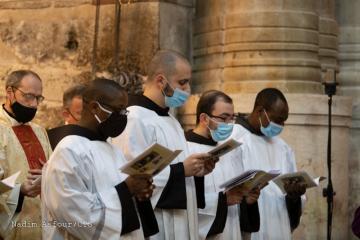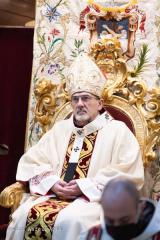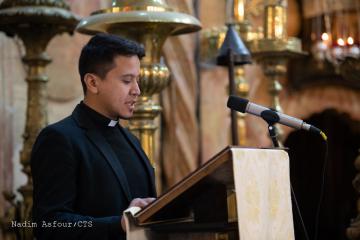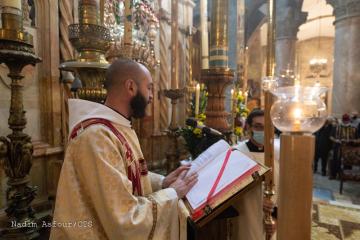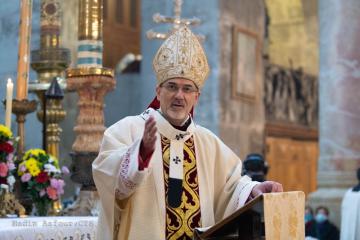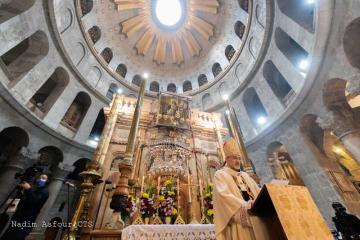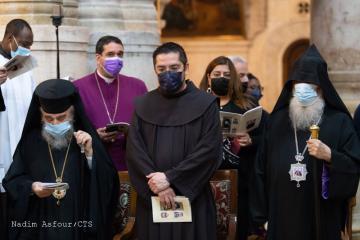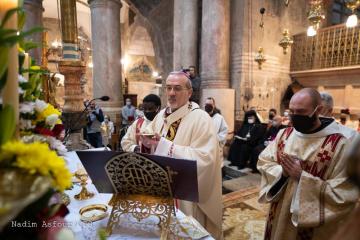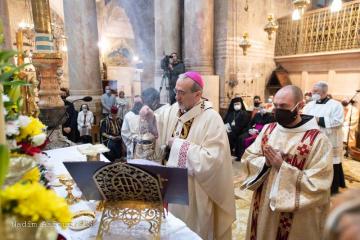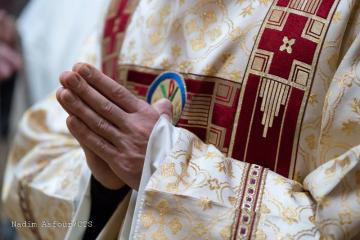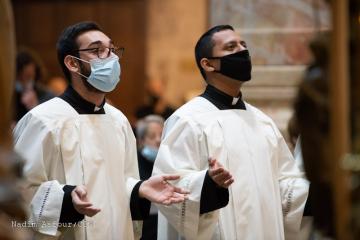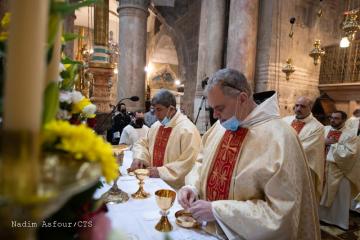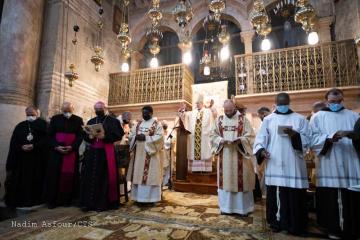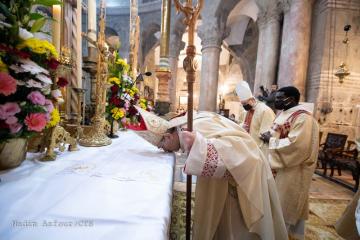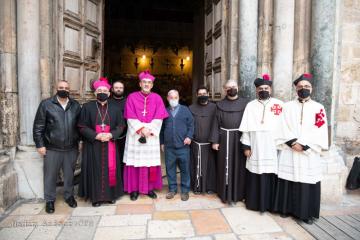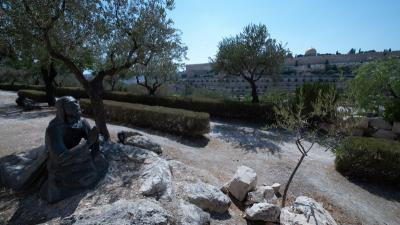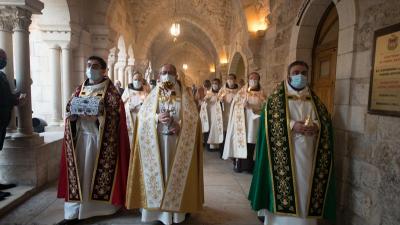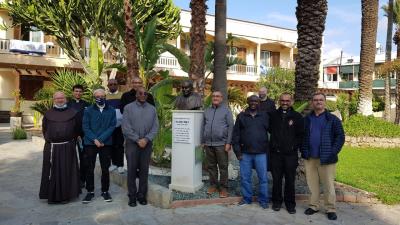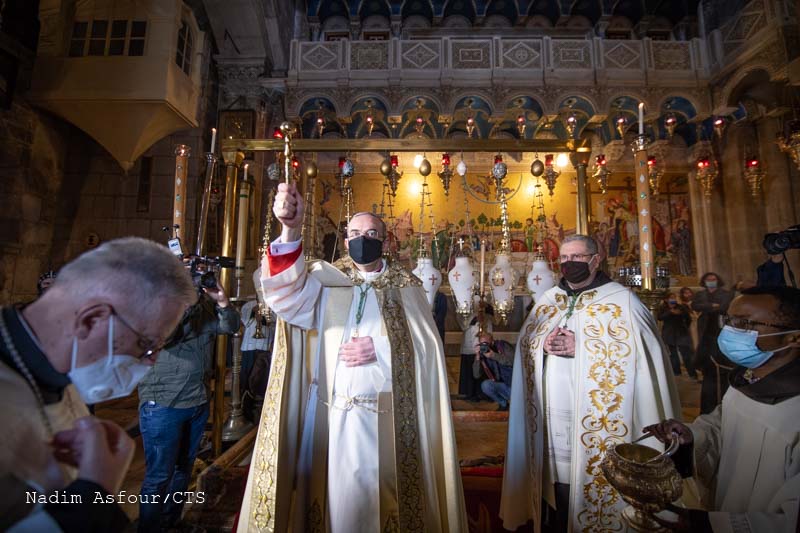
On Friday 4th and Saturday 5th December, His Beatitude Pierbattista Pizzaballa, recently appointed Latin Patriarch of Jerusalem, in the respect of tradition, made his solemn entrance into the Basilica of the Holy Sepulchre and then celebrated a Solemn Mass.
Starting out from the Latin Patriarchate, the delegation of Franciscan friars, together with that of the Patriarchate reached the Jaffa Gate, one of the entrances into the old city of Jerusalem: it is from this gate that the personalities to whom the right is reserved usually start the route which will take them to the square in front of the Holy Sepulchre for the entrance. As tradition has it, His Beatitude the Latin Patriarch, following a small number of priests and religious, arrived in front of the door of the Holy Sepulchre which for the occasion was opened and then closed again behind him.
After kissing the Stone of the Unction, the incensation and the aspersion with blessed water, the Custos of the Holy Land, Fr. Francesco Patton gave his speech of welcome. “For our part, as his brothers of the Custody of the Holy Land, custodians of this and of the other Holy Places by divine providence and by the will of the Church since the mandate of Pope Clement VI in 1342, we will accompany you and support you with prayer, which is part of the task that the Church has entrusted to us,” the Custos concluded. “We will do so not only here but in all the holy places. We will constantly be open to pastoral collaboration for the good of the local and of the universal Church. We will try to put our internationality at the service of the local Church so that it can build up the sense of brotherhood amongst everyone and the Church of Jerusalem can be the mother of all her children.”
On the notes of the “Te Deum” the Patriarch’s route continued towards the Edicule of the Anastasis, which he entered for a moment of prayer alongside the Custos of the Holy Land. This was followed by the reading of the Gospel and the reading of the Apostolic Bull of appointment of the Patriarch by Mons. Leopoldo Girelli, Apostolic Nuncio in Israel and Cyprus and Apostolic Delegate in Jerusalem and Palestine. After the translation of the Bull into Arabic and Italian, His Excellency Mons. Giacinto-Boulos Marcuzzo, Bishop Emeritus of the Latin Patriarchate in Jerusalem, made for a short speech in Arabic and in Italian. “You are now asked to be not only a good administrator, but a diocesan bishop, i.e. a real ‘father’ of this Mother Church of Jerusalem,” H.E. Mons. Marcuzzo said in his speech. “Now your ministry as a father will have a more pastoral, cultural and spiritual tone; perhaps just as challenging as that of Apostolic Administrator, but with a special flavour that is far more consoling and more corresponding to the soul of a pastor.” At the end, the Bishop gave the Pastoral Staff to the Patriarch, who changed places, moving to the Throne, in the centre of the religious who were present.
“I know I am not alone,” emphasized the Patriarch Pizzaballa from the Throne, during his speech. “Without the collaboration of his presbytery, the religious and his faithful, the Bishop could not lead his flock, and would not be the image of the Good Shepherd. Today you are here with me, perhaps not as many as we would have liked, but I know that from various parts of the Diocese and of the world, many faithful and pilgrims, both from our Diocese and not, are close to me in prayer, and it is in this spirit that we can meet as the Church, the Mother Church of Jerusalem.” As the conclusion of his speech, the Patriarch blessed those present, then moving off – following the delegation – towards the Patriarchate for the conclusion of this first part.
On the morning of the following day, Saturday 5th December, the Patriarch presided his first Solemn Mass in the Holy Sepulchre. This mass was also for very few people and behind closed doors, due to the restrictions imposed by the local authorities to fight the pandemic. “We are the Church of the Calvary, it is true, But it was precisely on Calvary, from the pierced heart of Christ, that the Church was born,” the Patriarch underlined in his comment on the Gospel. “Christ on the cross is not only the redemption of suffering, but in the first place love and forgiveness. We are therefore also the Church of love, which never sleeps, but keeps watch continuously, which is able to forgive and give live, always, without conditions.”
“We entrust this new Ministry to the Most Holy Virgin Mary,” His Beatitude Pizzaballa concluded. “She is a strong and righteous woman, who is at the foot of the Cross, but also a Virgin with the joy for the meeting with the resurrected Christ. Following her example, we can resist in an ordeal and, thanks to the action of the Holy Spirit, live in full the joy of feeling that we are always loved by God. ”
A few days before his entrance, a delegation of the Media of the Custody had met the Patriarch to ask him a few questions, including:
What do the years spent here mean for your life?
30 years in Jerusalem changes a life, I have spent half of mine here, let’s say the constructive part of my life, from the age of 25. It’s obvious that these 30 years have shaped me: the culture of Jerusalem, its people, the relations, the difficulties; it’s clear that I am starting this new service bearing in mind what my personal story has been here, what I have learnt, in good and in bad, and I am bringing what I am.
What are your feelings now?
On the one hand I am serene and at peace; there is also a little trepidation for what awaits me, because it is one thing as administrator to put out fires and another to sow, to plant and make things grow: it is a completely different responsibility and perspective.
I am already wondering how it is done, whether I am up to it, how long it all takes. There are many things that worry me, but one problem at a time: for now we are at the beginning.
Why do you think you were chosen?
It’s very difficult to answer: you would have to ask those who chose me, not me. Let’s say that it is a choice of continuity: I am a foreigner but I have also been here for thirty years, I am a foreigner but, at the same time, I am not. I know this situation fairly well, with its limits and also with my own limits. And the community here knows me, in my positive aspects and also my limits. So we can say it is a choice of continuity. I also think that now the local element of the Church is obvious and clear: it is a Church that has an Arab identity which is obvious. Therefore appointing a non-Arab is no longer to be interpreted as it may have been forty years ago: it is also an invitation to think of the universal vocation of this Church.
In your opinion, what distinguishes this local Church from other areas?
We are the Church that concretely is the guardian of the story of the Redemption; it is the place where the Word of God was written. We have to start from these two elements: the Word of God, which really has to accompany us in our lives – accompanies the whole Church all over the world, but here in a particular way. We should work a lot on what the Christian identity is here, what it means to be Christians here, what our roots are, where our roots are, because it is from this sense of belonging that all the rest comes into being.
What message do you want to leave at this particular time?
This crisis linked to Covid-19 has created first of all a great bewilderment in our communities: our diocese covers 4 countries, which have 4 different legislations on the subject and with different situations. Therefore we cannot have one law that is the same for everywhere.
It has also created great disorientation. We were not able to celebrate Easter in the normal fashion and probably Christmas will not be celebrated adequately, and this disorientates the community, because the celebration of these Mysteries are the hub around which our community lives.
The economic consequences are catastrophic, especially in Palestine and Jordan, above all due to the absence of pilgrims and tourists. More than a hundred Christian families have not worked since March and therefore they literally cannot reach the end of the month any more.
The school system is in a situation of crisis: we are in a phase of extreme uncertainty.
What I feel is right to tell my community is that this is not the first time that we have been in a crisis; we have had many intifadas that have blocked everything. I would like to tell them not to think of this situation as the end, as a drama, it is a difficult time, but not the end. We have the elements to support ourselves in the community: we cannot have the pilgrims, but it is the time for the community to find itself again.
Giovanni Malaspina


